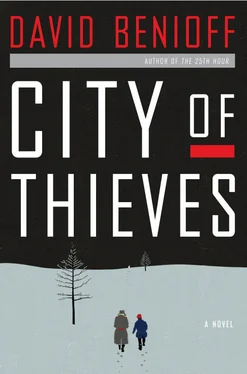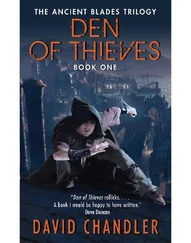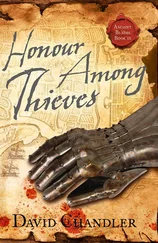“You’re a real cunt louse, you know that?”
“Take off your whites,” she replied. “You look like a ski soldier. They’ll notice you.”
Markov quickly unbuttoned his coveralls, sat in the snow, and pulled them over his boots. Below his whites he wore a quilted canvas hunting vest, several layers of woolen sweaters, and a pair of paint-splattered workman’s pants. He pulled a stick grenade from a canvas pouch, unwrapped a cigarette-size fuze, and inserted it into the head of the grenade.
“We’ll have to time it just right,” he said.
We huddled around the broad larch trunk, crouched and still, holding our breath as the first German soldiers passed by less than twenty meters away.
Nobody had bothered consulting with me, which made sense because I hadn’t opened my mouth to offer any suggestions. I hadn’t said a word since running out the door of the trapper’s cabin and now it was too late.
I didn’t like either of the options. A final shoot-out might have been fine for a hardened guerrilla like Markov, but I wasn’t ready for a suicide mission. Posing as a prisoner seemed a bizarre miscalculation—how long did prisoners survive these days? If anybody had asked me, I would have urged either another run, though I wasn’t sure if I could run much farther, or to try climbing the tree and waiting while the Germans passed beneath us. Hiding in the branches seemed like a better and better idea as the front end of the Gebirgsjäger company passed by without spotting us.
When the first ranks of Russian prisoners trudged past our tree, Vika nodded at Markov. He took a deep breath, walked toward the edge of the larch’s shadow, and hurled the grenade as far as he could.
From my vantage point I couldn’t tell if any of the Germans noticed the grenade flying overhead. I didn’t hear any shouted warnings. The grenade landed with a muffled thwup in the snow thirty meters away. For several seconds I was convinced it must have been a dud, until it exploded with enough force that snow showered down on us from the shaken larch branches.
Everyone marching with the company, mountain rangers and prisoners alike, crouched in momentary panic, looking to the left where a great geyser of snow had shot into the air. We slipped out of the tree’s shadow and walked unseen toward the ragged throng of Russians as the German officers began shouting orders, peering into the far woods with their field glasses, looking for snipers in the trees. We were so close to our captive countrymen: fifteen meters away, fourteen, thirteen, stepping softly, resisting the impulse to sprint the last short span. The Germans thought they saw movement in the distant bushes; there was a clamor of cries and directives, fingers pointing, soldiers dropping to their bellies, ready to fire from the prone position.
By the time they realized there were no enemies to the left, we had infiltrated from the right. A few of the prisoners noticed us joining in with them. They gave no sign of camaraderie or welcome. They didn’t seem surprised that four newcomers had joined their ranks; the captives, soldiers and civilians both, were so defeated they probably thought it was natural that Russians would emerge from the woods and secretly surrender to the enemy.
All of the prisoners were male, from young boys with missing teeth and frozen strands of snot clinging to their upper lips to old men with crooked backs and white stubble dusting their jaws. Vika had pulled her rabbit fur cap even lower; in her formless coveralls she looked enough like an adolescent boy that nobody glanced at her twice.
At least two of the Red Army men wore no boots, only their torn wool socks to keep their feet warm. The Germans considered a pair of Soviet-issue felt-lined leather boots a great prize, far warmer and more durable than their own footwear. The soldiers’ wool socks must have been soaked through with melted snow. When the temperature dropped and the socks froze, the two of them would have to walk with blocks of ice on their feet. I wondered how much farther they could go, how many kilometers, the numbness spreading from their toes to their calves to their knees. Their eyes were as dull and miserable as the eyes of the draft horses that dragged sledges through the snowy streets of Piter before the food ran out and the horses were slaughtered for their meat.
The Germans chattered in their own tongue. None of them seemed badly wounded by the fragmentation, though one young trooper with a thin red gash across his cheek had pulled off his glove so he could dab at the blood with his thumb and show it to his comrades, pleased with his first war wound.
“They think it was a land mine,” Kolya whispered. He squinted as he listened to the officers’ commands. “They must be Tyrolean. The accents are tricky. Yes, they’re saying it was a land mine.”
The orders from the officers trickled down to the troopers, who turned back to the meekly waiting prisoners and signaled with their rifles for the march to continue.
“Wait!” shouted one of the Russians, a thick-lipped civilian in his forties wearing a quilted down cap, the earflaps tied under his chin. “This man is a partisan!”
He pointed at Markov. Everyone else on the hillside had gone silent.
“He came to my house a month ago, stole all my potatoes, every bit of food in the place, said they needed it for the war! You hear? He is a partisan! He has killed many Germans!”
Markov stared at the civilian, his head cocked to one side like a fighting dog.
“Shut your mouth,” he said, keeping his voice low, his face bright red with anger.
“You don’t tell me what to do anymore! You don’t tell me what to do!”
A Leutnant stomped over, trailed by three troopers, shoving through the crowd of prisoners that had circled around Markov and his accuser.
“What is this?” he bellowed. He was clearly the translator for the company, speaking Russian with a Ukrainian accent. He looked like a fat man who had recently lost all the fat, his broad cheeks deflated, the heavy skin hanging slack across the bones of his face.
The accuser stood there with his finger pointing, an overgrown child with his earflaps and his trembling lips, addressing the Leutnant but never looking away from Markov.
“He is a murderer, this man! He has murdered your people!”
Kolya opened his mouth to speak out in Markov’s defense, but Vika jabbed him in the belly with a sharp elbow and Kolya kept silent. I could see his hand digging into his overcoat pocket, readying the Tokarev in case it was needed.
Markov shook his head, a strange, ugly smile splitting his lips.
“I shit on your mother.”
“You don’t look so brave now! You don’t look so hard! Sure, you’re the tough man when you’re stealing potatoes from common people, but now what are you? Eh? What are you?”
Markov snarled and snatched a small pistol from the pocket of his hunting vest. Burly as he was, he drew with the speed of an American gunslinger, raising the muzzle as his accuser stumbled backward and the prisoners gathered around dove out of the way.
The Germans were even faster. Before Markov could pull the trigger, a burst of automatic fire from the troopers’ MP40s punched a cluster of little holes through the front of his vest. He stumbled, frowning as if he’d forgotten an important name, and toppled backward, landing in the soft snow, wisps of down floating up from the perforated quilting of his vest.
The accuser stared down at Markov’s body. He must have known what his denunciation would lead to, but now that the act was done he seemed stunned by the outcome. The Leutnant considered him briefly, trying to decide whether to reward or punish the man. In the end he snatched up Markov’s pistol for a souvenir and walked away, leaving the whole mess behind. His young troopers followed behind him, glancing briefly at Markov’s body, wondering, perhaps, which one of them had fired the shot that actually killed him.
Читать дальше












